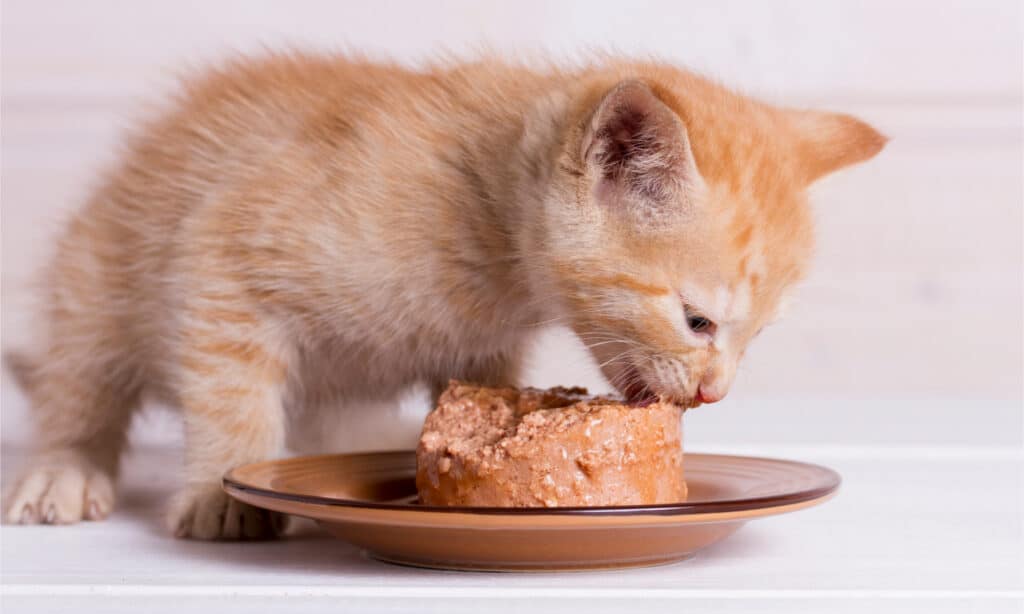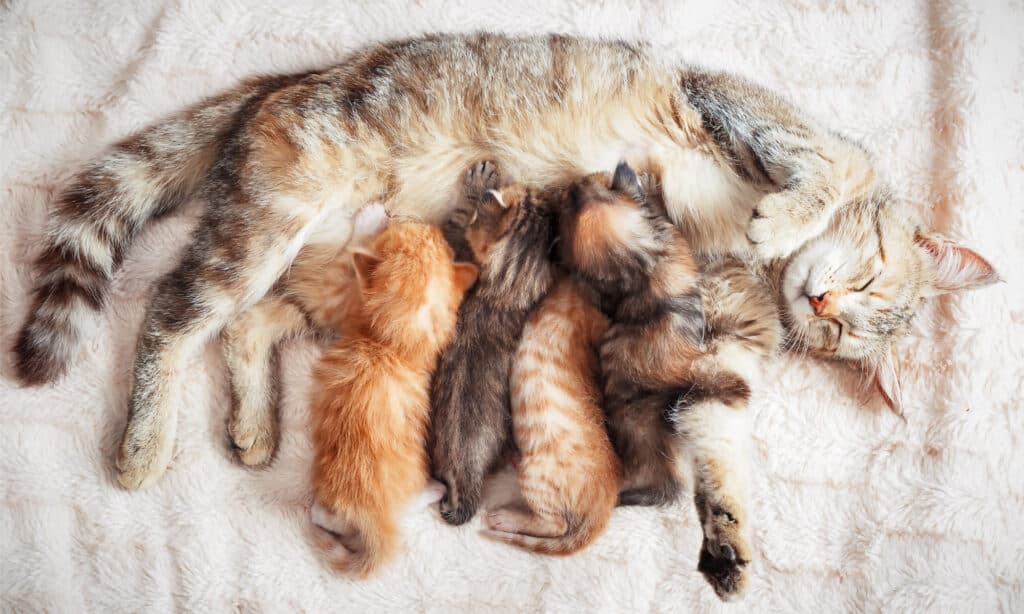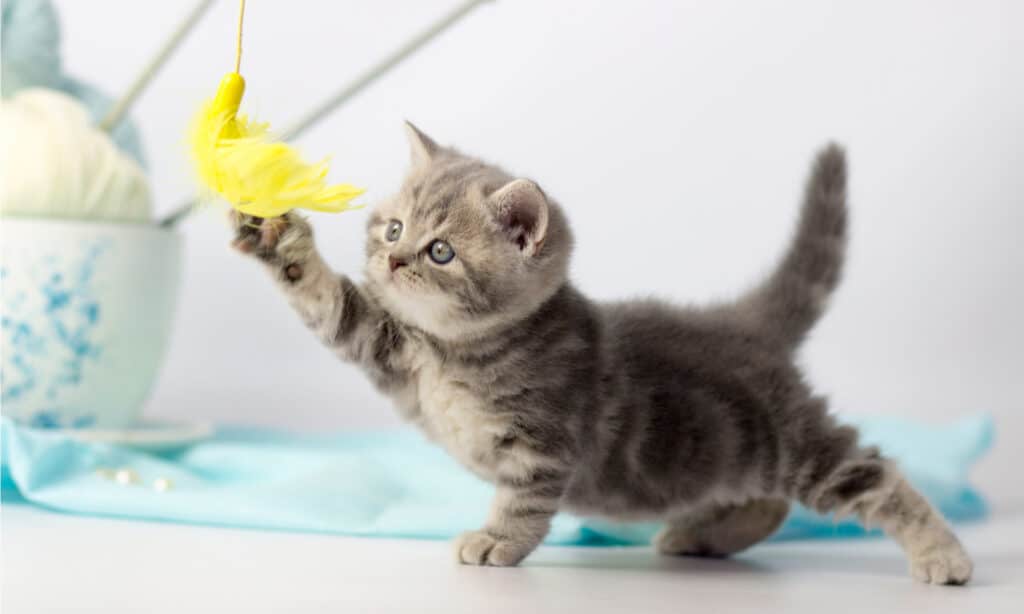Is anything on earth cuter than a kitten? Even people who don’t like cats would have a hard time denying a baby feline’s cuddly allure. But owning a kitten isn’t all fun and games. Kittens require robust sources of nutrition in order to grow into sleek, confident, healthy adult cats. Find out what to feed your kitten to help it flourish into maturity!
What Foods Do Kittens Eat?

Kittens can eat both wet and dry food as well as occasional foods like cooked meat and eggs or fish.
©Elizabett/Shutterstock.com
Kittens eat a variety of foods, including wet canned food, dry food, cooked meat and eggs, and fish. Cats are obligate carnivores, which means it is absolutely essential that they eat meat. The protein they need cannot be obtained through a vegetarian or vegan diet. While such a diet may work for humans, it’s important to recognize that a cat is a different beast entirely.
A kitten’s nutritional needs will vary as it grows. For the first four weeks, it will imbibe nothing but its mother’s milk. If you find yourself caring for a kitten this young without its mother, invest in a good milk substitute. After about 8 weeks, kittens should begin to transition to solid foods.
A Complete List of 11 Foods Kittens Eat
Kittens eat a surprising variety of foods, though meat will always be a staple of whatever diet they follow. Commercial cat foods should provide the bulk of their nutrition. If possible, buy a type of cat food specially formulated for kittens. A healthy diet can include and be supplemented by any of the following:
- Wet cat food
- Dry cat food
- Cat treats
- Catnip
- Cooked meats
- Cooked eggs
- Fish
- Salad greens
- Squash and pumpkin
- Some fruits
- Grass
Yes, kittens occasionally eat grass! It can be a source of micronutrients, though, in large quantities, it may cause intestinal upset. Interestingly, though kittens will eat grass, not all cats like catnip. Approximately one-third of cats are born without the gene that makes them enjoy this tasty treat.
Avoid giving your kitten bones to chew on, especially cooked bones, as these splinter easily and can cause serious health concerns. If you want to help your kitten through the teething stage and help alleviate boredom, invest in one of the many cat toys available in pet stores. Also, be sure to avoid common human foods like chocolate, onion, garlic, and caffeine products, as these are toxic to cats. Always check with your vet or another trusted source if you are unsure about giving your kitten a certain food.
Do Kittens Drink Milk or Water?

After being weaned, kittens no longer require milk in their diets. Cow milk can actually cause digestive problems.
©iStock.com/bozhdb
Kittens drink both milk and water. It’s vitally important to ensure that they have fresh water at all times, as this is the main way they hydrate after the first few weeks of their life. As they grow, they are slowly weaned off their mother’s milk, usually by about 8 weeks of age.
Contrary to popular belief, most cats are actually lactose intolerant, which means their gastrointestinal systems have trouble digesting most milk products. Cow milk, in particular, can cause difficulties and should never be given to kittens. After they are weaned, kittens don’t require milk in their diet and should transition naturally to solid foods.
Can I Feed My Kitten Dog Food?
It is not advisable to feed dog food to your kitten or cat in the long run. Cats, in general, need more protein than dogs, particularly the essential protein taurine, which cannot be obtained through dog food. Cats also require nutrients and fatty acids not found in meals tailored to canines. That having been said, a meal or two of dog food in an emergency should not harm your cat.
What Do Adult Cats Eat?
Adult cats eat everything kittens do, though their diet may also include rodents, birds, or other small animals. Once your kitten matures, it’s safe to feed them commercial cat food meant for adults. As with kittens, make sure your cat is getting ample protein in its diet, as a lack thereof can cause serious nutritional deficiencies.
Mixing or alternating wet and dry food can provide a broader nutritional scope for your cat and give them some variety. Dry food is usually cheaper and more convenient, while wet food helps with hydration. However, it can also lead to weight gain, as it is tastier and heavier than dry food.
Finding the balance between price, nutrition, and a healthy weight can take time and experimentation. Ultimately, your cat has individual needs that will become apparent over time.
How Do Kittens Hunt?

Kittens are instinctive hunters who learn to stalk prey at an early age.
©Katrin Baidimirova/Shutterstock.com
Kittens learn to hunt from their mothers at an early age. This is an important part of their development, as cats are predatory by nature. Mother cats will demonstrate the necessary skills, which her kittens will then enact on each other in play. Swatting, nipping, pouncing, and chasing are all typical expressions of this instinct.
By 8 to 16 weeks of age, kittens can be seen practicing their hunting skills by themselves. This doesn’t necessarily translate into a kill, especially for kittens who are mostly housebound. However, many cat owners have discovered a fresh kill in their house or on their front step, usually a rodent or bird. This can be an unpleasant experience, but unfortunately, it’s just the way cats are made!
This poses a potential problem for people who own pet rodents or birds. If a kitten is bold enough and it sees an opportunity, it may decide to harass the smaller pets in the house. At that age, it’s unlikely to kill your other pets, but it is still wise to secure them to avoid a confrontation.
It is possible to discourage your kitten from hunting by ensuring that they are sufficiently fed and have avenues to channel their aggression through play. Putting a bell on their collar to alert their prey may help to avoid a messy situation, as well as keeping them indoors at times when their prey is most active.
What Eats Kittens?
Several predators place cats, and kittens in particular, at risk of injury or death. Both urban and rural environments contain potential threats to a kitten’s wellbeing. Common predators include wolves, coyotes, foxes, snakes, and various birds of prey like hawks or owls.
If your kitten wants to go outside, but you’re afraid of predators, consider buying a covered playpen for the yard. This will expose the kitten to fresh air and new stimuli while still ensuring that it is safe. As your kitten grows, the risk posed by predators will diminish somewhat.
Kittens make precious pets and loveable companions, and it’s important to give them what they need to thrive and flourish. The right food will keep them healthy and active well into adulthood.
The photo featured at the top of this post is © iStock.com/anurakpong
Thank you for reading! Have some feedback for us? Contact the AZ Animals editorial team.






